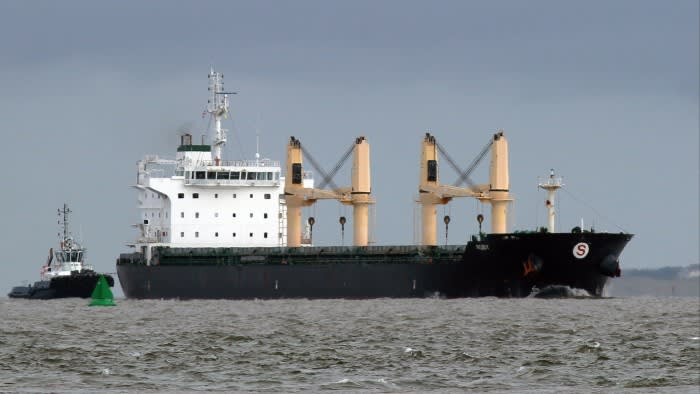Unlock the Editor’s Digest for free
Roula Khalaf, Editor of the FT, selects her favourite stories in this weekly newsletter.
A damaged ship carrying up to 20,000 tonnes of explosive ammonium nitrate from Russia has anchored off the Kent coast after being turned away by other European countries.
After leaving Russia’s Kandalaksha port last month loaded with the chemical, which is used as a fertiliser but can explode when exposed to fire, the Dubai-owned Ruby is now sitting about 17 nautical miles north-east of Margate, according to maritime authorities and ship-tracking group MarineTraffic.
The UK’s HM Coastguard said on Wednesday that the vessel, which has reported its destination as the Maltese port of Marsaxlokk, was securely anchored outside UK territorial waters and waiting for the appropriate conditions to refuel before passing through the English Channel.
Although there has been no suggestion of an imminent explosion, the ship has raised alarm bells after sustaining damage and being instructed to steer clear of ports in Norway and Lithuania, according to diplomats and intelligence experts.
The development has reawakened memories of a devastating blast in Beirut four years ago, when a warehouse storing ammonium nitrate caught fire and exploded in a blast that killed at least 200 people.
The Ruby is carrying more than seven times the amount of the explosive involved in the Beirut blast.
According to multinational maritime authority Paris MoU the ship is managed by Dubai group Serenity Ship Management. The incident has taken place amid broader safety concerns about Russia-linked shipping activity in Europe.
The ship has been closely watched since it tried to dock in the Norwegian Arctic port of Tromsø before being sent to anchor away from the coast in early September.
The Norwegian Maritime Authority said it understood the ship had hit ground when leaving port in Russia, leaving a crack in the hull and damage to its propeller and rudder.
But it added that inspectors would not have boarded the ship in Norway if there was a serious risk of explosion, and that the damage was minor enough for the crew to sail on to Lithuania tailed by a tug boat.
HM Coastguard said a tug contracted by the ship’s operators was now standing by the vessel, which remained “able to make its own way”.
Russia’s use of civilian craft to monitor crucial infrastructure, such as oil and gas pipelines in the North, Baltic and Norwegian Seas, has already sparked anxiety in Nordic countries and Nato.
A decrepit shadow fleet of tankers transporting the country’s oil has fuelled concerns, especially in Denmark and around the Baltic Sea, due to the risk of environmental disaster.
The Ruby could “be a great way of testing how Norwegian authorities and Nato would react” to a dangerous ship hitting trouble in their waters, said one Nordic diplomat as the ship sailed down Norway’s west coast and stalled outside Bergen, the country’s most important oil and gas base.
Finnish and Estonian authorities are separately investigating the cutting of a gas pipeline and data cable between the two countries last October by the anchor of a Chinese container vessel, which had stopped beforehand in Russia.
The sabotage of the twin Nord Stream gas pipelines in the Baltic Sea in 2022 remains unexplained by officials. German prosecutors are investigating whether a Ukrainian group was behind the act, while some Nordic officials have focused on the suspicious movements of Russian military vessels around the time of the explosion.
Additional reporting by Robert Wright


